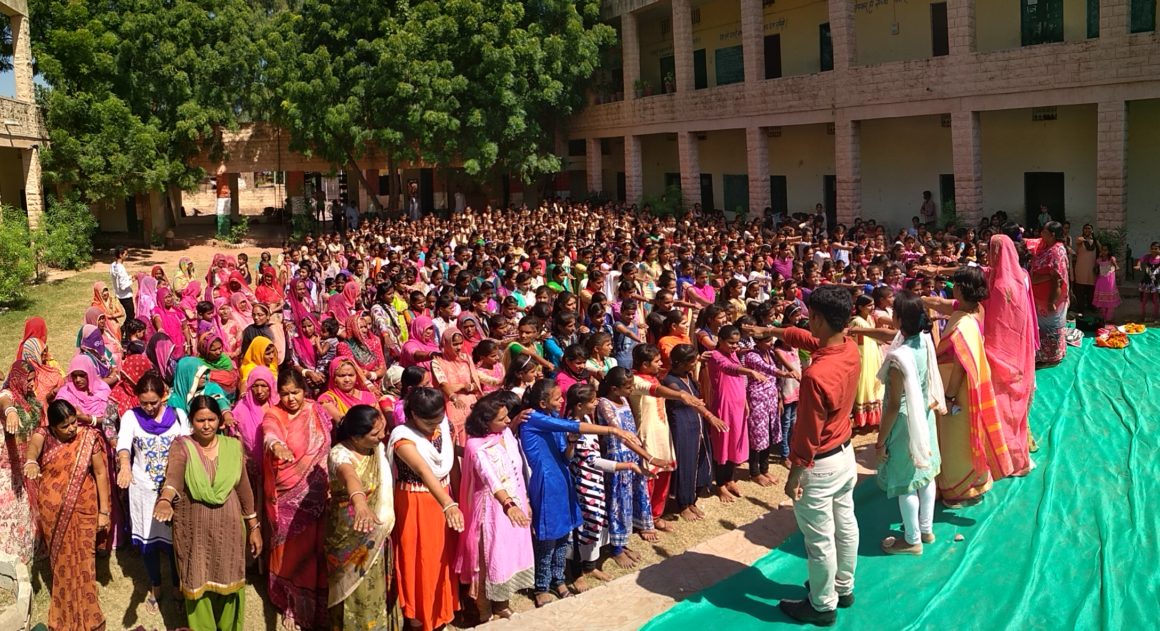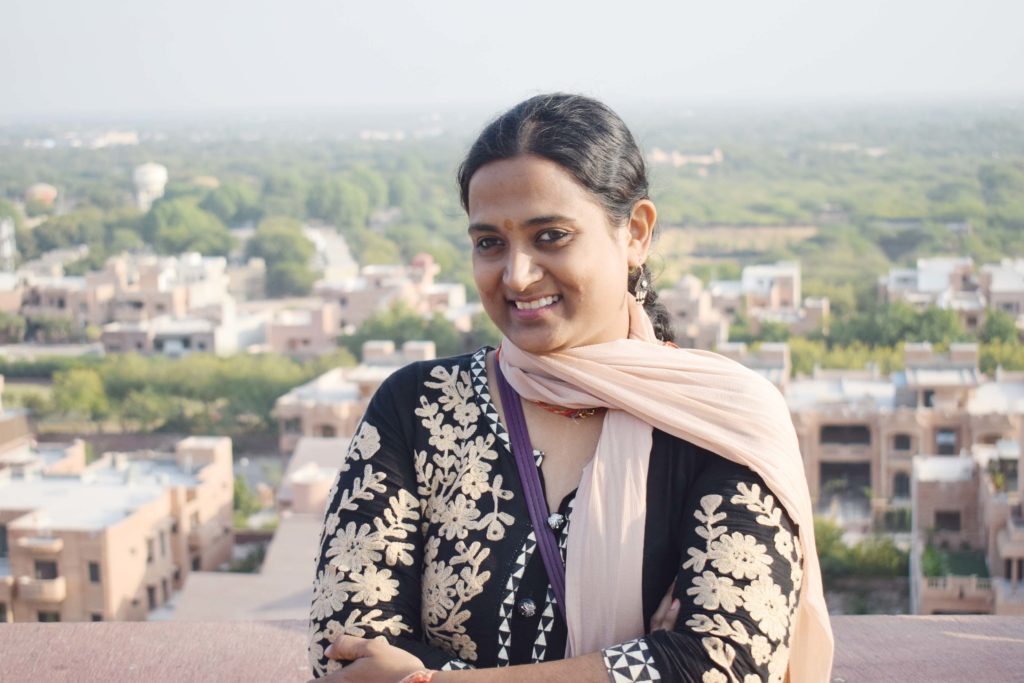
An interview with Dr. Kriti Bharti, who is dedicated to saving girls from child marriage.
Child marriage remains a pressing global concern. In India, there are twenty-three million child brides, the highest number in the world, and while most Indian states have shown decline in incidence of child marriage in the last ten years, statistics from Rajasthan indicate that it continues to be on the rise there. National Family Health Survey (2015-16) data shows that 26.8% of girls in India are married before their 18th birthday; in Rajasthan, the percentage of such girls is 35%. Rajasthan’s state government has pledged to make the state child-marriage free in the coming decade, but many of these young girls lack resources to leave marriages they were forced into.
Saarthi Trust was responsible for facilitating the first ever annulment of a child marriage in India in 2012. Started by Jodhpur-based rehabilitation psychologist, Dr. Kriti Bharti in 2011, the organization has subsequently been instrumental towards annulling 36 child marriages and preventing thousands from happening in Rajasthan. Recognizing that annulment of marriage was only part of the solution for the former child brides’ futures, Bharti established a rehabilitation program where the girls are given shelter, food, water, and counseling along with equipping them with educational and vocational skills to infuse their lives with new hope.
Bharti’s unwavering dedication towards fighting child marriage despite receiving death threats and encountering countless obstacles is shaped by her past, her faith, and her dream of “a society where all are free to fly in an open sky, unshackled from the handcuffs of exploitation and abuse.”
I spoke to her in Jodhpur to learn more about her journey.

How did you embark on this journey? What has made you so passionately involved?
I had a difficult childhood. My father abandoned me before my birth and my mother was under great pressure from my relatives to abort me. I endured much verbal and physical abuse while growing up. When I was ten years old, I got poisoned and was bedridden for months; I recovered only due to Reiki therapy two years later. It was then I took my first revolutionary step in life by renouncing my surname and adopting Bharti instead: it means daughter of India, reflecting my disavowal of any caste or community.
I studied Psychology in college in Jodhpur, where we would offer counseling to different NGOs; I felt that I was meant for this life. I worked with various NGOs before starting Saarthi Trust in 2011.
I believe that the inner transformations which I experienced during childhood turned me from a victim into a survivor. I didn’t have someone to protect me then, I too needed a Kriti Bharti in my life. These children will, though, and as much as is possible, I will help them.
Could you tell me more about your fight against child marriage?
I fight abuse of any kind and in case of child marriage, it happens to encompass many pressing issues such as sexual abuse, child labor, education, and health.
While Rajasthan is known for its cultural heritage and beauty, the fact remains that it is one of the most backward states in India with many malpractices against women occurring there: child marriage, female feticide, sexual exploitation, and unequal educational opportunities. We are working to change the mindset wherever we go for there is a lot to be done. However, I take positives from the fact that the first child marriage annulment in India happened in Rajasthan too, hopefully becoming a catalyst for other changes.
Do you think child marriage is on the decline? What role has government played in the situation? What do you think will really bring about change?
There has been no decline in child marriage. What I have seen on field and in government-recorded data are two entirely different things. Let’s say the administration receives information that a child marriage will be occurring somewhere; they will prevent it from happening along with counselling the parents, recording it that they did so. Yet, I have encountered many instances where the administration prevented the marriage from occurring but the ceremony nevertheless happened anyway few days later. Nowadays the families organizing the weddings have become very savvy: there are no photographers, no wedding invitations printed and very few people invited to the wedding. If you don’t have evidence that a wedding took place, how can you prove it? I feel that a strict follow up is required once the wedding has been stopped, the administration must vigilantly monitor the children involved until they turn 18 and 21 years old [legally permissible age for marriage in India].
There has been no decline in child marriage. What I have seen on field and in government-recorded data are two entirely different things. Click To TweetA child marriage happens when a girl-child is perceived as a burden in her family, believing she should be married off into another family and become their responsibility. One can’t attribute it to lack of education; I have seen it happening in educated families too. Those performing child marriages don’t want to leave behind tradition, they still would like to uphold it at any cost. The women involved say, it happened with us too and all was fine. A child bride once told her mother, “I experience pain in sexual activities, my husband beats me too,” and her mother responded, “you will have to endure it, like I did.” The mothers themselves don’t realize that what they experienced was abuse and exploitation. As it is, a girl grows up conditioned to living a life of restrictions and marriage subsequently becomes an extension of that of adjustment.
While the focus so far has been on stopping child-marriages, I believe that they are no less than a disease and I want to focus on a curative approach by eradicating them in the first place.
You have received so many death threats. Why are people so threatened? What keeps you going nonetheless?
Those who are threatened are those who promote child marriage at any cost: the families of the children involved, politicians, and community leaders. The grooms’ families are getting a daughter in law, the politicians are thinking of vote-banks and in the meantime, community leaders believe that they are the court, having the right to make decision for people’s lives. They also accrue financial benefits by allowing child marriages to take place. If family resists getting their daughter married and supports her, community-leaders threaten to ostracize and ask them to pay hefty fines up to 20 lakh rupees (US$ 29, 200). The families are often daily-wage earners, how will they raise such a huge amount?
As for what keeps me going on, given my past, I have seen life and death very closely; after all, I was close to death even before being born. I have also seen exploitation at close hand. That inner fear of death has gone having endured what I have. But those who threaten me do not realise the struggles I have experienced and how they have strengthened my resolve to fight child marriage. These death threats now no longer affect me; in fact, they have become a part of my life.
The Government Is Attacking Native Families Through Their Children
theestablishment.co
What has been your biggest success? What has been your biggest challenge? Has there been a moment when you wanted to give up?
I am most happy when a child gets her marriage annulled. I see her being liberated from the shackles of an untimely bond and learning to see life as being full of golden opportunities instead.
Yes, there have been many times when I felt stuck; I need a lot of courage and optimism to see myself through those times and I derive it from my strong faith in God.
One of my most challenging times was when I rescued a girl, Sushila Bishnoi at 4am from the highway in Barmer district which is 300 km from Jodhpur in 2016. Sushila was twelve years old, wanting to get her marriage annulled. After acquiring her legal custody with great difficulty, the real challenge came about proving Sushila’s marriage. Her father was a criminal and knew how to circumvent the law; he declared that there had been no marriage, just talk of engagement. No villager in the meantime was willing to testify against the family in fear of violent retribution. How could I annul her marriage when there no marriage had supposedly taken in the first place?
I see her being liberated from the shackles of an untimely bond and learning to see life as being full of golden opportunities instead. Click To TweetThe family threatened to kidnap me too amongst issuing other threats. I was wondering how to overcome the situation given that there was no evidence whatsoever to prove the marriage. It was then Facebook came to my rescue; I looked up Sushila’s husband and discovered he updated daily on Facebook. We sifted through seven years worth of updates to see if there were any incriminating pictures or comments which could help us prove the fact that he was married. We eventually collected evidence and presented it the to court. The annulment happened last year. Her family however refused to support Sushila and she has been with me since.
Laxmi Sargara was the first woman in India to annul her child marriage. What has been the impact?
We conduct orientation camps across Rajasthan raising awareness about why child marriages are bad. Lot of media coverage has helped too. We run a helpline to encourage anyone to report about the occurrence of a child marriage. No matter how dire their situation, the girls somehow contact me or someone else informs us.
In case of Laxmi, she was an 18 year old child-bride and did not want to go to her in laws’ home; she ran away from home and asked me for help to get out of the marriage. Divorce was a huge stigma for a woman in a rural set up and I wanted to find a permanent and alternate solution. Everyone told me that I was wasting my time, I should just get the brides divorced. However, I was clear about differentiating between divorce and cancellation of a marriage. I wanted to return to the girl her dignity and singlehood: she had never been married because what she had experienced was not a marriage. I researched extensively and learnt of the Prohibition of Child Marriage Act (2006), which allows child marriage to be nullified provided either of the individuals appeal to the court within two years of maturity. It was just that not many people knew about it and which we took avail of in Laxmi and others’ cases.
Only Laxmi has married again. The other girls are all focused on their careers, committed to being economically independent. They are not interested in marriage right now. They recognise that marriage is a part of life, not life itself.

